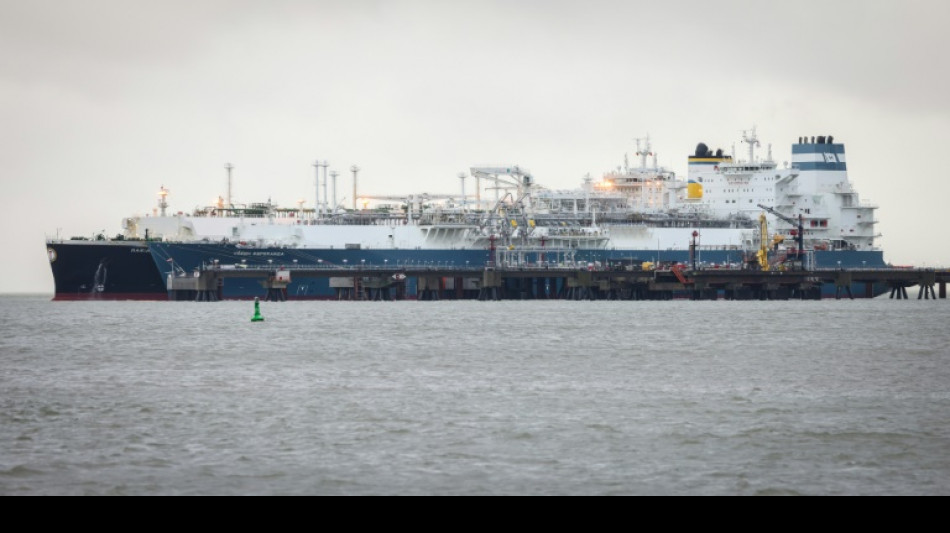
-
 US freestyle skier Ferreira wins Olympic halfpipe gold
US freestyle skier Ferreira wins Olympic halfpipe gold
-
Svitolina edges Gauff to set up Pegula final in Dubai

-
 'Proud' Alcaraz digs deep to topple Rublev and reach Qatar final
'Proud' Alcaraz digs deep to topple Rublev and reach Qatar final
-
UK govt considers removing ex-prince Andrew from line of succession

-
 New study probes why chronic pain lasts longer in women
New study probes why chronic pain lasts longer in women
-
Trump vows 10% global tariff after stinging court rebuke

-
 Aston Martin in disarray as Leclerc tops F1 testing timesheets
Aston Martin in disarray as Leclerc tops F1 testing timesheets
-
Venus Williams accepts Indian Wells wild card

-
 Anxious Venezuelans seek clarity on new amnesty law
Anxious Venezuelans seek clarity on new amnesty law
-
Last-gasp Canada edge Finland to reach Olympic men's ice hockey final

-
 Scotland captain Tuipulotu grateful for Wales boss Tandy's influence
Scotland captain Tuipulotu grateful for Wales boss Tandy's influence
-
Zelensky says no 'family day' in rare personal interview to AFP

-
 Zelensky tells AFP that Ukraine is not losing the war
Zelensky tells AFP that Ukraine is not losing the war
-
Sweden to play Switzerland in Olympic women's curling final

-
 Counting the cost: Minnesota reels after anti-migrant 'occupation'
Counting the cost: Minnesota reels after anti-migrant 'occupation'
-
UK police probe Andrew's protection as royals reel from ex-prince's arrest

-
 Doris says Ireland must pile pressure on England rising star Pollock
Doris says Ireland must pile pressure on England rising star Pollock
-
US military assets in the Middle East

-
 Neymar hints at possible retirement after World Cup
Neymar hints at possible retirement after World Cup
-
Stocks rise after court ruling against US tariffs

-
 Australia end dismal T20 World Cup by thrashing Oman
Australia end dismal T20 World Cup by thrashing Oman
-
Olympics chief says Milan-Cortina has set new path for Games

-
 Russian SVR spy agency took over Wagner 'influence' ops in Africa: report
Russian SVR spy agency took over Wagner 'influence' ops in Africa: report
-
Pegula fights back to sink Anisimova and reach Dubai final

-
 Trump administration denounces 'terrorism' in France after activist's killing
Trump administration denounces 'terrorism' in France after activist's killing
-
Colombia's Medellin builds mega-prison inspired by El Salvador's CECOT

-
 German broadcaster recalls correspondent over AI-generated images
German broadcaster recalls correspondent over AI-generated images
-
US Supreme Court strikes down swath of Trump global tariffs

-
 England's Itoje says managing 'emotional turmoil' key to 100 cap landmark
England's Itoje says managing 'emotional turmoil' key to 100 cap landmark
-
Trump says weighing strike on Iran as Tehran says draft deal coming soon

-
 Tudor is '100 percent' certain of saving Spurs from relegation
Tudor is '100 percent' certain of saving Spurs from relegation
-
Azam dropped for scoring too slowly, says Pakistan coach Hesson

-
 Stocks volatile after soft US growth data, court ruling against tariffs
Stocks volatile after soft US growth data, court ruling against tariffs
-
Italy bring back Capuozzo for France Six Nations trip

-
 From Malinin's collapse to Liu's triumph: Top Olympic figure skating moments
From Malinin's collapse to Liu's triumph: Top Olympic figure skating moments
-
Arteta urges Arsenal to 'write own destiny' after title wobble

-
 Ukraine Paralympics team to boycott opening ceremony over Russian flag decision
Ukraine Paralympics team to boycott opening ceremony over Russian flag decision
-
Wales captain Lake wants fans to bring 'noise' against Scotland

-
 Skier Vonn's Italian hospital a hotbed of men, sister says
Skier Vonn's Italian hospital a hotbed of men, sister says
-
India target S.Africa top order, Abhishek to come good: bowling coach

-
 Carrick praises Man Utd 'diversity' after Ratcliffe's immigrant rant
Carrick praises Man Utd 'diversity' after Ratcliffe's immigrant rant
-
I never thought it would be hit, says 'Scream' creator 30 years later

-
 AI summit statement delayed to 'maximise' signatories: India
AI summit statement delayed to 'maximise' signatories: India
-
Barcelona's Sagrada Familia basilica hits peak height

-
 Milan sprints to second straight UAE stage win as Tiberi keeps lead
Milan sprints to second straight UAE stage win as Tiberi keeps lead
-
US GDP growth misses expectations as Trump blames shutdown

-
 Benfica investigate video of fans' monkey gestures
Benfica investigate video of fans' monkey gestures
-
French minister pledges tight security at rally for killed activist

-
 Guardiola 'couldn't care less' about Arsenal stumble in title race
Guardiola 'couldn't care less' about Arsenal stumble in title race
-
UK police search property as royals reel from Andrew's arrest


Reliable European demand fuels US natural gas boom
Rising demand from Europe has added to a US natural gas investment boom even as the industry struggles to overcome opposition to pipeline construction.
Production of the fuel reached 3.1 trillion cubic feet for the month of October, according to the most recently available US data, an all-time high and up almost 50 percent from the level a decade ago.
The industry has been in growth mode since the summer of 2021 when Russia began trimming shipments to Europe, according to Steven Miles, a fellow at Rice University's Banker Institute in Houston.
That comes on the heels of the US shale revolution in the first decade of the 21st century that ultimately led to the United States becoming a net exporter of the fuel in 2017.
The progression has not been continuous, with plummeting natural gas prices crimping investment and leading to the bankruptcy of one of industry's biggest players, Chesapeake Energy, in June 2020.
But energy companies have become more confident in the long-term demand outlook for the fuel in light of shifting geopolitical dynamics.
Five years ago, the long-term demand "was not nearly as clear as it is today," said Eli Rubin of EBW AnalyticsGroup, a consultancy.
"Especially after Russia invaded Ukraine, we have a healthy new respect for natural gas' role in providing energy security, for its role in helping to tame consumer pricing."
Even before the invasion, there was heavy investment in facilities to transform gas into liquefied natural gas (LNG). In recent years, some 14 new liquefaction terminals have been approved, with the first set to begin operating in 2024.
"Over the next five years, we could potentially double US LNG exports," Rubin said.
The push comes as big energy companies enjoy rich cashflow courtesy of lofty commodity prices that have enabled the industry to invest aggressively even as they boost share buybacks and dividends.
- Pipeline blockage -
While the growth of LNG has globalized the natural gas market to a limited extent, the dynamics remain heavily localized.
Prices on the benchmark European TTF contract are currently more than six times the level of comparable Henry Hub contract in the United States.
That gap means that LNG exports are priced more closely to the US level, setting the stage for "middlemen" who can move the cargoes to Europe and "sell them at European prices," said Miles.
Much higher exports of US natural gas could lead to more price consistency across regions -- but probably not for many years.
"Maybe in the long run ... (the United States will) export so much gas to Europe that prices between Europe, Asia and North America become more aligned," said Ryan Kellogg, a professor at the University of Chicago specializing in energy.
"But I think we're pretty far away from that right now."
One lingering challenge facing the industry is the lack of pipeline capacity, particularly in the northeastern part of the United States.
The nation's biggest natural gas basin, the Marcellus Shale, which is mostly in Pennsylvania, faces constraints due to lack of infrastructure.
A venture called the Mountain Valley Pipeline stands as a potential solution, but the project has been suspended for the last five years amid resistance from land owners and environmentalists.
Opposition by climate activists and elected officials to industry-backed projects is "certainly much stronger than it was," said Rubin.
But the lack of infrastructure can exacerbate price volatility during periods of peak demand.
New England, which is in northeastern United States, relies on LNG for a fraction of its heating.
But the region, which normally sees some of the coldest weather in the country, is also known for resisting new pipeline capacity.
During a cold snap, "New England is competing with Europe for a spot LNG cargo," said Rubin. "For the cargo to go to New England, they have to pay higher prices than Europe."
F.Bennett--AMWN



